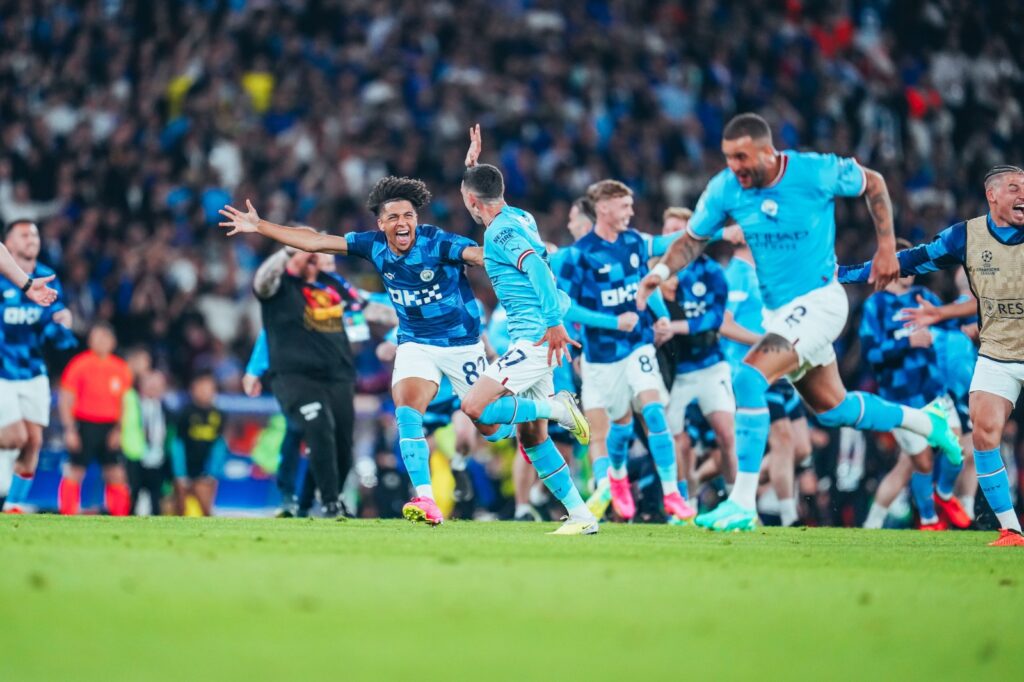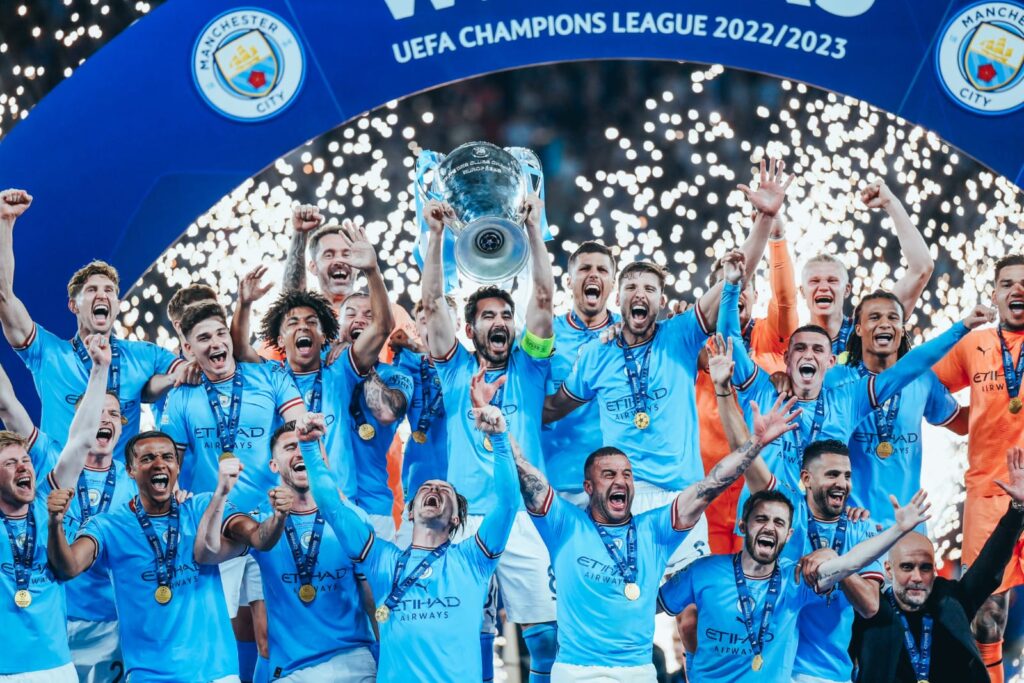
Rodrigo Hernández Cascante, Rodri, if you go by how he’s commonly known, isn’t renowned for his goal-scoring prowess. Like Fernandinho, the Brazilian who anchored Manchester City’s midfield before him, and Pep Guardiola, his manager who played the role for Johan Cruyff’s Barcelona Dream Team, Rodri isn’t a regular at finding the back of the net. But when he does, they tend to be priceless. It was Rodri’s goal that gave City parity against Aston Villa after they had been 2-0 down on the final day of the 2021-22 season. Had City lost, Liverpool would have been league champions. At the Ataturk Stadium on the outskirts of Istanbul a year on, Rodri went one better. After 68 minutes of a scrappy final, the ball broke to him just inside the box, and the strike into the corner was pristine.
This certainly wasn’t how Pep Guardiola would have planned his third Champions League triumph as a coach. Internazionale, given next to no chance before kick-off, had some gilt-edged chances to equalise. Romelu Lukaku, a 57th minute substitute for Edin Dzeko – part of City’s first great team of the Abu Dhabi Football Group era – got in the way of Federico Dimarco’s follow-up header after the first one had looped on to the bar. Late in the game, Lukaku headed straight at Ederson from point-blank range with the entire width of the goal to aim it. There was also a left-footed shot that flew wide after he had broken clear.
City’s fluency was clearly affected by Kevin de Bruyne going off with what looked like a hamstring injury after 36 minutes. Phil Foden, the ‘Stockport Messi’ who replaced him, was a sprightly presence who could have had a goal with a better finish, but he isn’t yet ready to orchestrate a game the way de Bruyne can.
Back in 2021, when City lost to Chelsea, de Bruyne lasted just an hour before a collision with Antonio Rudiger left him with a broken nose and eye socket. This time, he at least had the consolation of seeing the result go his team’s way. But without de Bruyne’s probing passes and surging runs into the box, City were half the threat, and quite unrecognisable from the side that so imperiously brushed aside Real Madrid 4-0 in the second leg of the semifinal.
Credit too to Inter and Simone Inzaghi. They didn’t create much at all in the first two-thirds of the game, but the players tracked back superbly and allowed City neither the space nor time to find any rhythm. Erling Haaland was peripheral, while Jack Grealish and Bernardo Silva were left frustrated by the tenacity of the Inter full-backs and frequent niggling fouls.
Ultimately though, Guardiola got his 300th win as City coach, and the 600th of what is now possibly the greatest coaching career of all. Only Jupp Heynckes (1998 and 2013) and Ernst Happel (1970 and 1983) have had longer gaps between European Cup/Champions League wins. When Guardiola won his second with Barcelona, the club of his heart, in 2011, he was just 40. No one would have imagined that he would be well into his 50s by the time No.3 came along.
For City, this has been a long time coming. They may not have the local or global following of their cross-town rivals in red, but City have always been one of England’s best-supported clubs. That was very much evident when they briefly slipped into the third tier of English football in the late 1990s, and still took thousands of fans to away games. When City eventually escaped Division Two, as it was then, with a penalty shootout win on May 30, 1999, celebrations were tempered by the knowledge that ‘that other team’ had just won the treble of Premier League, FA Cup and European Champions League just four days earlier. It’s not without reason that Colin Shindler, a Cambridge academic and well-known City fan, wrote: Manchester United Ruined My Life.
Even City’s greatest moment in European football prior to Istanbul was tinged with farce. When they made it to the European Cup Winners’ Cup final on April 29, 1970, at what was then the Praterstadion in Vienna, only a few thousand fans travelled to the game. The others didn’t even get to watch live on television as goals from Neil Young and Franny Lee gave them a 2-1 win over Poland’s Górnik Zabrze in torrential rain. With only three TV channels in the UK at the time, the telecast of the City final was shelved in favour of showing the FA Cup final replay between Chelsea and Leeds United.
Within a decade of that success, City had started the slide into irrelevance and near-oblivion. For those fans who have seen the entire journey, including that heart-stopping game against Gillingham, this will be sweeter still. For Guardiola, this is a second treble, making him the first man do it with two different clubs. The cynics may write off the first by saying that he had Lionel Messi, Andres Iniesta, Xavi Hernandez, Thierry Henry and Samuel Eto’o in his side. They may try and use financial fair-play rules to try and take the gloss off this achievement. But if you love the game of football, you’ll recognise just how much important Guardiola and his perfectionist streak have been, especially coming soon after a period of what Jorge Valdano, Argentine World Cup winner in 1986, called shit-on-a-stick football.
City didn’t sing tonight as Guardiola’s Barcelona did in the 2011 final. But that doesn’t matter. City have broken the glass ceiling now, and the sky truly is the limit. Right now, that sky is very much City-blue.




